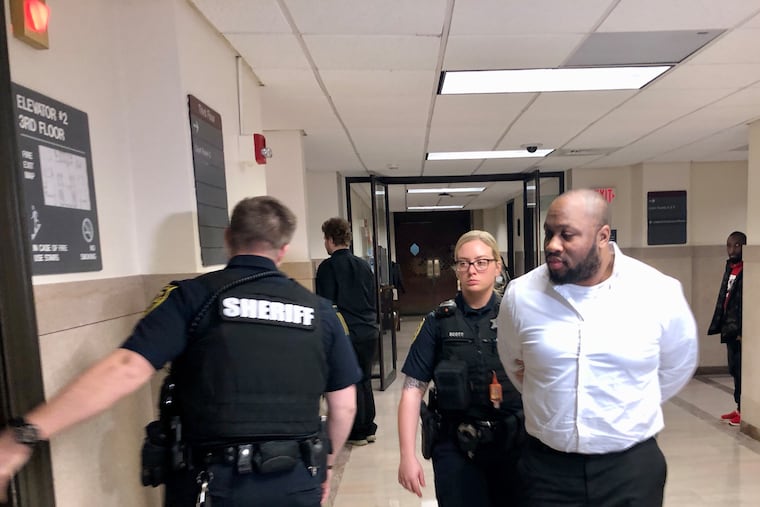Trial begins for Limerick man accused of killing his business partner and burying her body in a shallow grave
Blair Watts is accused of killing Jennifer Brown after defrauding her of $14,000 she had invested into his restaurant, prosecutors said Wednesday as Watts' murder trial began.

A Limerick man choked his business partner to death and buried her body in a shallow grave, prosecutors said Wednesday at the start of his trial on murder charges.
Blair Watts, 33, killed Jennifer Brown, 43, an investor in his failing restaurant, according to Deputy District Attorney Kelly Lloyd. She described Watts as “a broke narcissist who only cared about himself and the image he projected.”
But Watts’ defense attorney urged jurors not to let empathy for the victim overtake them and to render their verdict based solely on the evidence.
Watts, of Royersford, is charged with first- and third-degree murder in the death of Brown, his longtime friend.
Lloyd said in her opening statement that Watts had persuaded Brown to invest in a restaurant he had planned to reopen, but instead he spent her investment on personal expenses. When Brown learned that and also discovered that Watts had yet to even sign a lease for the eatery, she threatened to expose him, Lloyd said, “and his life began to unravel.”
“She was killed in her home by someone she cared about, by someone she confided in, by someone she considered family,” the prosecutor said. “Someone who took advantage of that trust and manipulated her whole reality.”
Watts reported Brown missing on Jan. 4, telling police he last saw her when he picked up her 8-year-old son, Noah, for a sleepover the day before to “give Brown a break,” prosecutors said. Yet, the sleepover took place on a school night, and Noah did not have his needed medication, something the boy’s teachers at Upper Providence Elementary testified Wednesday was unusual for the doting mother.
Noah, in a recorded statement played for the jury, said Watts told him his mother “was at the store” on Jan. 3 when he picked him up from his bus stop. Noah said he didn’t talk to or see his mother after that.
The child’s behavior suffered at school the next morning without his medication, according to testimony Wednesday. Brown’s mother, Anita Pallitto, said she began to worry when her calls to her daughter went unanswered, especially as it got closer to the time for her to pick Noah up from school.
» READ MORE: A Southwest Philly man who shot at a cop outside the King of Prussia Mall was convicted of attempted murder
Staff at Upper Providence Elementary called police to conduct a wellness check. Officers met Watts, who was waiting at the bus stop to pick up Noah, and he told them he hadn’t heard from Brown since the night before, when he said they arranged Noah’s sleepover at his house.
Two weeks later, a passerby discovered Brown’s body in a hastily dug grave at a warehouse in Royersford, prosecutors said. Cell phone records later recovered by police showed that Watts had been outside that warehouse for an extended period the day after he reported Brown missing.
An autopsy revealed that Brown had been killed by asphyxia, and her ribs had been broken. A forensic pathologist ruled her death a homicide, likely by choking. Fragments of a hair clip found with Brown’s body were discovered embedded in the carpet of her home, suggesting she had been killed there. Soil taken from that grave was “identical” to soil later found inside Watt’s car, according to Lloyd.
» READ MORE: West Philly man who murdered ex-girlfriend and unborn child given 2 life sentences after avoiding death penalty
Watts’ attorney, Michael Coard, told jurors that any sympathy they may feel for Brown is normal, but that neither that nor “name-calling” by prosecutors is relevant to the case.
“What if he really is a ‘broke narcissist?’ Does that make him a murderer?” Coard asked. “All the stuff you might despise him for ... that could be true and it could be completely false. But in a courtroom, all that matters is the law.”
In the end, he said, prosecutors must still prove their case.
“For as much as we must focus on what the case is about, we must also not focus on what it’s not about,” he said. “If the prosecution has evidence, bring it.”
Brown and Watts had known each other for a while, and had agreed to be partners in Birdie’s Kitchen, a restaurant Watts hoped to open in Phoenixville, prosecutors said. Financial records showed that over the course of a few months, Brown had agreed to pay Watts $14,000 to be a partial investor in the eatery. She paid that amount in full well before her disappearance.
However, banking records revealed that additional transfers for $17,000 were made to Watts from Brown’s account after her death. Other transfers from Brown’s accounts had previously failed, and the successful transfers only went through after two-factor authentication had been suddenly deactivated on Brown’s Cashapp account, according to prosecutors.
“The defendant tried his best to cover up the horrible murder he committed,” Lloyd said. “But lies are harder to keep track of than the truth. It caught up with him.”